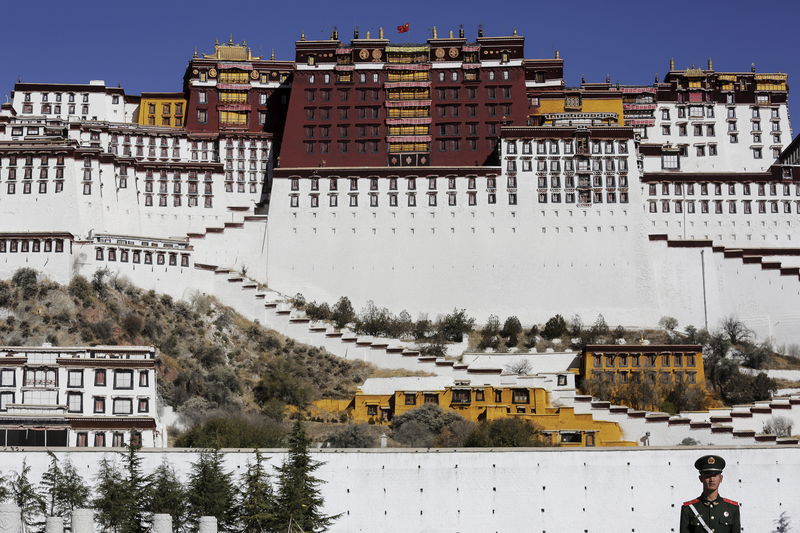(Adds comments from Taiwan rally)
BEIJING/SYDNEY/TAIPEI, March 10 (Reuters) - China said it would "resolutely strike" against the "Dalai Lama clique's separatist activities" as protesters planned demonstrations in major world cities on Friday to mark the anniversary of a Tibetan uprising against Chinese rule in 1959.
The sensitive anniversary coincided with the yearly news conference of Tibet's delegation to China's annual meeting of parliament, under way in Beijing.
Che Dalha, Tibet's governor, said the government would "hold a clear-cut stand against separatism, resolutely strike against the Dalai clique's damaging and separatist activities".
"The most important task is to protect our motherland's frontier regions, build up our homes, absolutely not allow any groups to separate even one inch of our land from the motherland," said Tashi Yangjen, a representative of the tiny Lhoba ethnic minority of southeast Tibet.
Chinese troops marched in and took control of Tibet in 1950 in what Beijing calls a "peaceful liberation".
China views the Dalai Lama, Tibet's Buddhist spiritual leader who fled into exile in India after the failed uprising, as a dangerous separatist. The Nobel Peace laureate denies espousing violence and says he only wants genuine autonomy for Tibet.
International human rights groups and exiles routinely condemn what they call China's oppressive rule in Tibetan areas. They say pervasive surveillance and displays of military force are being used to intimidate and quell dissent, which has included Tibetan Buddhist monks self-immolating in protest at lack of religious freedom.
Sophie Richardson, China director at Human Rights Watch, said Chinese authorities were again shutting off travel and holding military parades "to bully the Tibetan population into silence".
"Progress on human rights is only going to happen if the Chinese government replaces its intimidation tactics with a more open approach to information, expression and peaceful dissent," she said.
Foreign journalists are not allowed to travel to Tibet without government approval, while all foreigners have been barred during sensitive periods.
Tibet's most senior Communist Party official, Wu Yingjie, said foreign reporters were welcome as long as "they objectively and accurately report the changes in Tibet, the blissful lives of the masses, Tibet's ethnic unity and religious harmony".
INTERNATIONAL PROTESTS
In Sydney, 200 protesters marched to the Chinese consulate to protest against the lack of human rights in Tibet, with larger demonstrations planned later on Friday in cities including Taipei and London.
The protesters, many dressed in traditional Tibetan chupas, waved flags and shouted, "Human rights for Tibet," as they made their way past shoppers and office workers.
"We hope this kind of movement might bring the message to the world that we are still under Chinese suppression," third generation Tibetan Tashi Gyatso said.
Chinese university student Nancy Cao, from Shijiazhuang, the capital of the northern province of Hebei, said she was confused about the protest.
"Tibet is always a part of China in our history," said Cao, adding that the Chinese government had helped Tibet develop.
In an interview with comedian John Oliver which aired this week, the Dalai Lama said Chinese hardliners had parts of their brain missing and suggested he might be the last Dalai Lama, prompting China to brand him a "deceptive actor". self-ruled Taiwan, which Beijing claims as its own, about 100 people gathered for a candlelight walk in Liberty Square (NYSE:SQ) in Taipei, the capital.
"Tibet's situation is quite similar to Taiwan's," said Chen Jing, 25, a Taipei rally participant in previous years. "If you support Taiwan independence, you would also support Tibet independence.
"I think it's very important to hold these rallies because a lot of people who watch are curious about Tibet, and if you haven't been exposed you might not know why it's fighting for itself, since in the past it has been described in teaching materials as part of China."
Proudly democratic Taiwan has shown no interest in wanting to be ruled by autocratic China.
In the Indian capital of New Delhi, hundreds of Tibetans, waving flags and shouting anti-China slogans, marched towards the Chinese embassy, only to be halted by police.
"Tibet is not part of China," said Tenzin Metok, a protester. "We want freedom."
